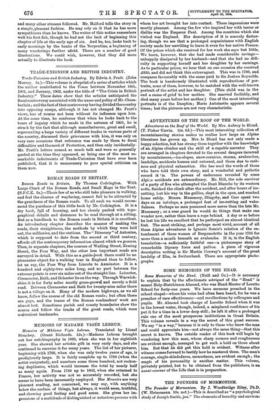MEMOIRS OF MADAME VIGEE LEBRUN.
Memoirs of Meldante Viggo Lebnot. Translated by Lionel Strachey. (Grant Richards. 125.)—Madame Lebrun brought out her autobiography in 1885, when she was in her eightieth year. She showed her artistic gift in very early days, and she continued to exercise it for many years. The list of her pictures, beginning with 1768, when she seas only twelve years of age, is prodigiously large. It is fairly complete up to 1789 (when the artist emigrated), and numbers some three hundred, not reckon- ing duplicates, which would increase the total by nearly half as many again. From 1789 up to 1802, when she returned to France, her activity was not so accurately recorded, but she seems to have been incessantly employed. Her Memoirs are very pleasant reading, not concerned, we may say, with anything below the surface of things, but always, it would seem, truthful, and showing good feeling and good sense. She gives her im- pressions of a multitude of distinguished or notorious persons with
SOME MEMORIES OF THE HEAD.
tionte Memories of the Head. (Neill and Co.)—It is necessary to explain that by the affectionate sobriquet of the "Head" is meant Hely-Hutchinson Almond, who was Head-Master of Loretto School for forty-one years. We have sermons preached in the school chapel—where his voice had often been heard, for he was a preacher of rare effectiveness—and recollections by colleagues and pupils. Mr. Almond took charge of Loretto School when it was in the lowest water, though, indeed, a misplaced confidence of his put it for a time in a lower deep still ; he left it after a prolonged rule one of the most prosperous institutions in Great Britain. This volume reveals in a way the secret of this great success. We say " in a way," because it is only to those who knew the man and could appreciate him—not always the same thing—that this secret is known. The outside reader of this book will begin by wondering how this man, whose sharp corners and roughnesses are evident enough, managed to get such a hold on those about him. But that he did get that hold is evident. Witness after witness comes forward to testify how he mastered them. The man's courage, single-Mindedness, earnestness, are evident enough ; the magic of his personality is another matter. This volume, privately printed, but to be obtained from the publishers, is au avent-coureur of the Life that is in preparation.
THE FOUNDER OF MORMONISM. The Pounder of Mornionism. By J. Woodbridge Riley, Ph.D. (W. Heinemann. 10s. net.)—This is described as "a psychological study of Joseph Smith, jun." The elements of heredity and onviron-






















































 Previous page
Previous page